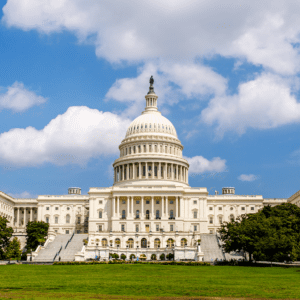By: Christina Del Greco, BS/BA

In the spirit of embracing Washington DC, this year’s annual meeting has multiple exciting opportunities for attendees to learn about ASHG’s policy priorities, and attendees will get to see and engage with an exciting selection of the different policy issues related to human genetics and genomics research.
Genomic Data Sharing Panel:
ASHG will be holding a panel discussion about genomic data sharing. This event will be hosted by ASHG’s Government and Public Advocacy Committee (GPAC) and will bring together a variety of stakeholders to discuss the value of making large genetic and genomic datasets widely available. The goal of this panel is to engage with some of the complexities involved in data sharing, including how to incorporate diverse perspectives and priorities in research as well as how to responsibly work with members of and data from historically underrepresented or marginalized populations. This panel should open a dialogue to discuss this topic from a variety of perspectives and will provide researchers the opportunity to better understand the different factors that influence how to go about making data open and accessible.
Policy Luncheon:
ASHG is hosting a policy luncheon for interested junior investigators and trainees to discuss emerging questions about population descriptors in genomics research (note: you’ll have to purchase tickets in advance to attend). This event is hosted by the Professional Practice and Social Implications Committee (PPSI). There has been much recent discussion about how to incorporate race, ancestry, and ethnicity labels into genomics studies, with the goal of effectively incorporating human diversity into research studies while also avoiding the misuse of population descriptors. This luncheon will give members the opportunity to learn about this issue, discuss ways to integrate new ways of thinking into their research, and think deeply about how we use race, ethnicity, and ancestry labels in genomics research. With the luncheon being geared towards junior investigators and trainees, this is a great opportunity to shape the way research is performed in the future.
Policy-related Platform Sessions:
There will be multiple policy-related platform sessions to attend throughout the duration of the meeting (which you can find in the meeting’s online planner!). These sessions address topics such as equity in Australian Aboriginal genomics, ethical considerations of social and behavioral genetics, and access to precision medicine. For attendees interested in these types of specific policy and advocacy topics, these sessions will provide a great opportunity to learn about the nuances of these issues and what research is being done to address them.
ASHG Policy and Advocacy Booth:
As usual, ASHG will have a policy and advocacy booth at ASHG Central in the exhibit hall. Members interested in getting involved in policy and advocacy at ASHG will be able to talk with members of ASHG’s policy staff, GPAC members, and ASHG policy fellows about available opportunities. For example, the Advocacy Certificate for Genetics and Genomics Trainees (ACGT) program, which is currently training its second class of members, opens applications for 2024 in the fall. Current and past ACGT members (including myself!) recently participated in Hill Day to communicate ASHG’s support for robust NIH funding to Congress members, and their program culminates with a final policy project which may include op-eds, Congressional meetings, and more. ACGT trainees will also have the chance to participate in additional policy-focused networking events at the meeting. Other opportunities for interested ASHG members include the variety of ASHG fellowships (including policy, education, and communication fellowships for PhD-holders and a new postbaccalaureate fellowship) and service opportunities on GPAC.
This year’s annual meeting is full of opportunities to learn not only about cutting-edge genetics and genomics research, but also about some of the many ethical and policy-related issues that we as genetics researchers need to grapple with. It is exciting to hear that this year’s annual meeting is providing so many opportunities to learn about these policy issues and creating the space for these important discussions to occur!
